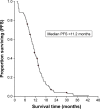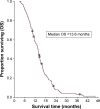The effectiveness of EGFR-TKIs against brain metastases in EGFR mutation-positive non-small-cell lung cancer
- PMID: 28490892
- PMCID: PMC5415007
- DOI: 10.2147/OTT.S129809
The effectiveness of EGFR-TKIs against brain metastases in EGFR mutation-positive non-small-cell lung cancer
Abstract
Brain metastases are usual in non-small-cell lung cancer (NSCLC) with poor prognosis and few available therapeutic options. This retrospective study aims to evaluate the efficacy of epidermal growth factor receptor-tyrosine kinase inhibitors (EGFR-TKIs) against brain metastases from NSCLC harboring activating EGFR mutation. A total of 148 patients with brain metastases from EGFR mutation-positive NSCLC were analyzed retrospectively. The patients were orally given gefitinib (250 mg) or erlotinib (150 mg) once a day until intracranial disease progression, death, or intolerable side effects. A survival analysis was done using the Kaplan-Meier analysis and log-rank test. Objective response rate and disease control rate within brain lesions were 36.5% and 87.2%, respectively, with a median progression-free survival (PFS) and overall survival (OS) of 11.2 months (95% confidence interval [CI], 10.1-12.3) and 13.6 months (95% CI, 12.3-14.9), respectively. The patients' characteristics were not statistically associated with PFS and OS. EGFR-TKIs showed promising antitumor activity against brain metastases in NSCLC patients with activating EGFR mutation and might be the treatment choice in this clinical setting.
Keywords: EGFR inhibitors; brain metastases; mutation; non-small-cell lung cancer; targeted therapy.
Conflict of interest statement
Disclosure The authors report no conflicts of interest in this work.
Figures


Similar articles
-
Preventing and treating brain metastases with three first-line EGFR-tyrosine kinase inhibitors in patients with EGFR mutation-positive advanced non-small cell lung cancer.Ther Adv Med Oncol. 2018 Sep 25;10:1758835918797589. doi: 10.1177/1758835918797589. eCollection 2018. Ther Adv Med Oncol. 2018. PMID: 30263066 Free PMC article.
-
Effects of epidermal growth factor receptor-tyrosine kinase inhibitors alone on EGFR-mutant non-small cell lung cancer with brain metastasis.Thorac Cancer. 2016 Nov;7(6):648-654. doi: 10.1111/1759-7714.12379. Epub 2016 Sep 1. Thorac Cancer. 2016. PMID: 27755835 Free PMC article.
-
Prolonged survival of patients with EGFR-mutated non-small cell lung cancer with solitary brain metastases treated with surgical resection of brain and lung lesions followed by EGFR TKIs.World J Surg Oncol. 2017 Oct 16;15(1):184. doi: 10.1186/s12957-017-1252-y. World J Surg Oncol. 2017. PMID: 29037198 Free PMC article.
-
Effect of smoking status on progression-free and overall survival in non-small cell lung cancer patients receiving erlotinib or gefitinib: a meta-analysis.J Clin Pharm Ther. 2015 Dec;40(6):661-71. doi: 10.1111/jcpt.12332. Epub 2015 Nov 17. J Clin Pharm Ther. 2015. PMID: 26573867
-
Brain Metastases in NSCLC - are TKIs Changing the Treatment Strategy?Anticancer Res. 2015 Nov;35(11):5797-806. Anticancer Res. 2015. PMID: 26504000 Review.
Cited by
-
Non-small Cell Lung Cancer with Multiple Brain Metastases Treated with Radiosurgery and Erlotinib: A Case Report.Cureus. 2017 Dec 29;9(12):e2003. doi: 10.7759/cureus.2003. Cureus. 2017. PMID: 29507851 Free PMC article.
-
Therapeutic Schedule Evaluation for Brain-Metastasized Non-Small Cell Lung Cancer with A Probabilistic Linguistic ELECTRE II Method.Int J Environ Res Public Health. 2018 Aug 21;15(9):1799. doi: 10.3390/ijerph15091799. Int J Environ Res Public Health. 2018. PMID: 30134591 Free PMC article.
-
Management of Intracranial Metastases in EGFR-Mutated NSCLC: A Review of Literature following an Unusual Case Report.Case Rep Oncol Med. 2021 Jul 2;2021:5526809. doi: 10.1155/2021/5526809. eCollection 2021. Case Rep Oncol Med. 2021. PMID: 34306781 Free PMC article.
-
Factors Affecting 2-Year Survival in Patients With Non-Small Cell Lung Cancer Brain Metastases: Evidence from Indonesia's National Cancer Center, Jakarta, Indonesia.Clin Med Insights Oncol. 2023 Jun 14;17:11795549231178172. doi: 10.1177/11795549231178172. eCollection 2023. Clin Med Insights Oncol. 2023. PMID: 37359276 Free PMC article.
-
Drug resistance occurred in a newly characterized preclinical model of lung cancer brain metastasis.BMC Cancer. 2020 Apr 7;20(1):292. doi: 10.1186/s12885-020-06808-2. BMC Cancer. 2020. PMID: 32264860 Free PMC article.
References
-
- Torre LA, Bray F, Siegel RL, Ferlay J, Lortet-Tieulent J, Jemal A. Global cancer statistics, 2012. CA Cancer J Clin. 2015;65:87–108. - PubMed
-
- Villarreal-Garza C, de la Mata D, Zavala DG, Macedo-Perez EO, Arrieta O. Aggressive treatment of primary tumor in patients with non-small-cell lung cancer and exclusively brain metastases. Clin Lung Cancer. 2013;14:6–13. - PubMed
-
- Shepherd FA, Pereira J, Ciuleanu T, et al. National Cancer Institute of Canada Clinical Trials Group Erlotinib in previously treated non-small-cell lung cancer. N Engl J Med. 2005;353:123–132. - PubMed
-
- Mok TS, Wu YL, Thongprasert S, et al. Gefitinib or carboplatin-paclitaxel in pulmonary adenocarcinoma. N Engl J Med. 2009;361:947–957. - PubMed
LinkOut - more resources
Full Text Sources
Other Literature Sources
Research Materials
Miscellaneous

